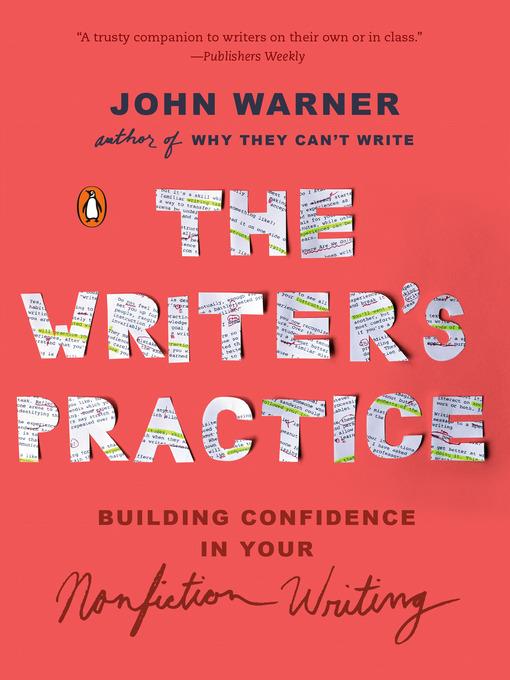
The Writer's Practice
Building Confidence in Your Nonfiction Writing
فرمت کتاب
ebook
تاریخ انتشار
2019
Lexile Score
1040
Reading Level
6-8
نویسنده
John Warnerشابک
9780525504931
کتاب های مرتبط
- اطلاعات
- نقد و بررسی
- دیدگاه کاربران
نقد و بررسی

October 22, 2018
Warner (The Funny Man) generously offers useful hints for improving nonfiction writing. He intends the book, he states at the beginning, “for anyone who wants to improve their writing, which is everyone because everyone is a writer.” To Warner, writing covers not just books, articles, and essays, but text messages, e-mails, social media posts, office memos, and homework. To develop a writer’s practice, he bases his creative, process-oriented assignments, or “experiences,” on the idea that learning is doing. His writing philosophy, introduced first, covers attitude and skills, plus habits of mind, such as curiosity and openness. Each section, whether on analytical, research-based, or humorous writing, follows the same rubric, which comprises audience, purpose, and process; the latter means selecting subjects, considering audience, and drafting text. As a bonus, Warner proffers short, skillful essays on topics like procrastination and failure. Throughout, he wields common sense, humor, and self-deprecation (despite publishing half a dozen books and spending 20 years teaching writing). Warner’s style reads like informal, intelligent conversation founded on a genuine desire to share what he knows, and his helpful book will serve as a trusty companion to writers on their own or in class.

December 1, 2018
With 20 years experience teaching college-level writing and producing a weekly column for the Chicago Tribune, Warner (Why They Can't Write) has sharpened his eye toward educational reform. He argues that instead of passively following rules, students must develop the habit of critical thinking and decision-making--starting with an exercise: describe how to make a peanut butter jelly sandwich. Deceptively simple, this writing "experience," to which the author has submitted thousands of students, reveals in most a filtering of perspective favoring the writer--not the reader/audience. The lesson? Always consider how others' ideas and emotions might be brought to the text. Six sections cover "Getting Started," "The Writing Process," "Making Inferences from Observations," "Analytical Writing," "Research and Argument," plus "Other Writing Experiences"--humor, advice (to self and others), profiles/tributes, and more. Warner emphasizes that all writers (including the best-known) improve over time with no conceivable "finish line." Perhaps his most effective approach focuses on production, process, and reflection, rather than on judging using traditional grading. VERDICT An essential guidebook in or outside the classroom for anyone who wants to think, act, and communicate as a writer.--William Grabowski, McMechen, WV
Copyright 2018 Library Journal, LLC Used with permission.

December 1, 2018
In this uber-handy guide, veteran rhetorician Warner invites readers to sharpen their written communication skills. Writing is a practice, Warner explains, just like any other discipline, and involves a lot more than just putting pen to paper (or the twenty-first-century equivalent). Individuals and teachers alike will find this a useful tool for improving basic skills of nonfiction writing. Warner outlines how to build a persuasive argument, how to craft a proposal, how to analyze an academic work or work of art, how to look for credible sources, even how to write a simple joke. Each of the skill sections comes with many activities (practices) to sharpen readers' understanding of the approach. Reading this is a bit like nostalgically sitting in a college-level composition class, abandoning high-school writing expectations in favor of a more mature style. The guide is well-organized and extremely readable, infused with the perfect amount of Warner's personality and experiences. Unique and thorough, Warner's handbook could turn any determined reader into a regular Malcolm Gladwell.(Reprinted with permission of Booklist, copyright 2018, American Library Association.)

























دیدگاه کاربران